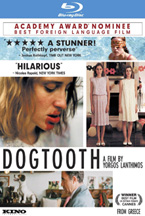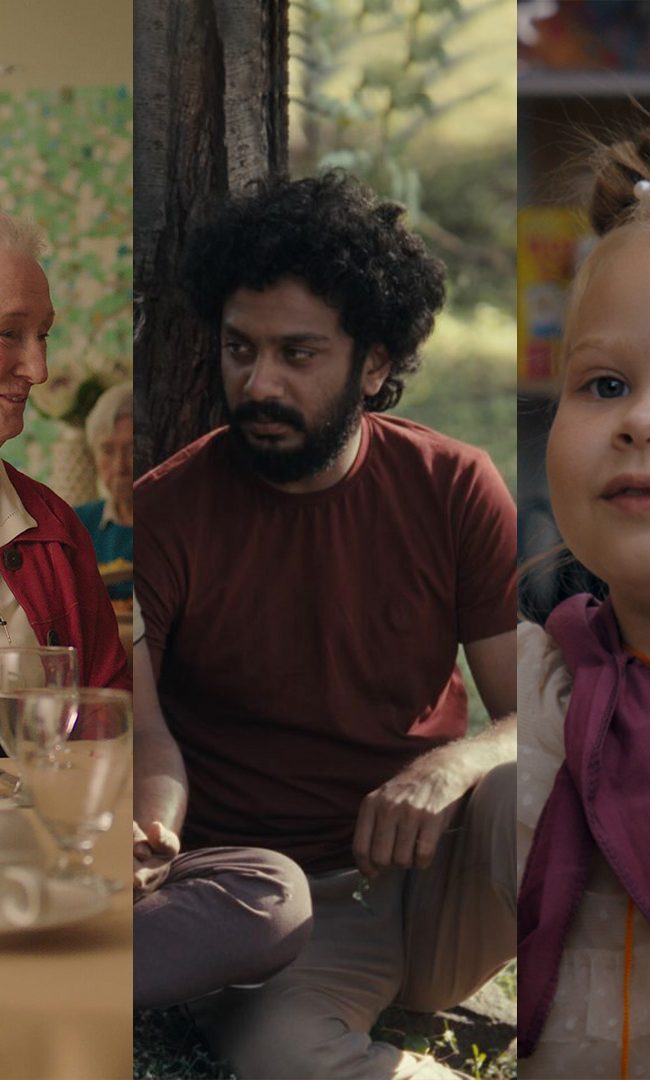
(Winner of the Prix Un Certain Regard at Cannes 2009 and nominated for Best Foreign Language Film at this year’s Academy Awards, Dogtooth is now available on DVD and Blu-ray through Kino International.)
I may have been too unsettled during my first viewing of Dogtooth to fully appreciate how funny it is. Comedy doesn’t get any darker than Yorgos Lanthimos’s oft-disturbing tale of family values run amok, and though it’s at times difficult to watch, there’s something delightful about the matter-of-fact manner in which the anti-humor unfolds. Lanthimos may not always fully let us in on his extended joke, but there’s never any doubt that he knows what he’s doing. It’s sometimes easy to imagine a smirk on the Greek auteur’s face while contemplating the range of reactions his film might elicit, but he’s no mere provocateur. There’s clearly a point (make that points) to the troubling goings-on, and in making Dogtooth oblique without being deliberately inaccessible, Lanthimos forces viewers to suss out meaning on their lonesome.
The Dogtooth clan consists of an authoritarian father, a passive mother, and three twentysomething siblings (a boy and two girls) in a state of arrested development. They reside in a closed filial system of a Greek villa into which, via an unscrupulous surrogate hired by the father to satiate his son’s sexual needs, “evil” in the form of old VHS tapes of Rocky and Jaws is eventually allowed entry. It’s never revealed why the father goes to such great lengths to create an alternate reality within his own home; though presumably a misguided attempt to protect his children from the outside world of which they have no accurate knowledge, it’s hard to imagine them encountering anything out there as horrific as what they’re exposed to daily at home. The center is clearly not holding, but Lanthimos exercises as assertive a directorial hand over his film as the father does over his family. In this way, Dogtooth‘s madness acts as a semi-controlled organism: erratic but reined in.
 There’s an unmistakably childlike quality not only to the unnamed siblings’ bizarre, eventually incestuous dealings with one another but, just as importantly, their mannerisms. As early as the opening scene, in which the siblings try to think up a game to play, it’s clear from both what they do and how they go about doing it that something is fundamentally off. Time and again, Lanthimos takes the mundane childhood pastimes that constitute sibling rivalry—collecting stickers, racing, trying to impress one’s parents—and inverts them to the point of perversion: the siblings recite wildly inaccurate definitions of common words, inhale a chloroform-like anesthetic in order to pass out and see who wakes up first, and bark like dogs to fend off potential cats (which, the father assures them, are the most dangerous animal known to man). These games maintain an almost constant tension that’s frequently broken by violent outbursts, but never at the expense of humor. Dogtooth‘s wit doesn’t bite; it froths at the mouth.
There’s an unmistakably childlike quality not only to the unnamed siblings’ bizarre, eventually incestuous dealings with one another but, just as importantly, their mannerisms. As early as the opening scene, in which the siblings try to think up a game to play, it’s clear from both what they do and how they go about doing it that something is fundamentally off. Time and again, Lanthimos takes the mundane childhood pastimes that constitute sibling rivalry—collecting stickers, racing, trying to impress one’s parents—and inverts them to the point of perversion: the siblings recite wildly inaccurate definitions of common words, inhale a chloroform-like anesthetic in order to pass out and see who wakes up first, and bark like dogs to fend off potential cats (which, the father assures them, are the most dangerous animal known to man). These games maintain an almost constant tension that’s frequently broken by violent outbursts, but never at the expense of humor. Dogtooth‘s wit doesn’t bite; it froths at the mouth.
The film is nothing if not satire, but it’s hard to say of what. Social conditioning, the strange forms a delayed sexual awakening can take on, and unchecked power are all as useful as interpretations as they are ultimately lacking. The revelation of the title’s significance, however, points definitively to a fixation on family: “A child is ready to leave the home when the dogtooth comes out.” Certain of the siblings’ body parts, especially and most often their heads, are frequently partially or entirely out of frame. More than just an appropriately off-putting stylistic touch, this also serves as a nod toward Lanthimos’s conception of the siblings as not-yet-fully-formed and, indeed, prone to intermingling sex and violence.
Dogtooth isn’t an easy film to recommend—perhaps the only comparable work that comes to mind is Salo, which itself is enough to scare off most—but those who can stomach it will find its rewards are many. Lanthimos presents individual moments of horror so shockingly that one often feels dared not to laugh. Case in point: the Flashdance-esque dance number, whose musical accompaniment is of special note. While his sisters dance away, the brother finger-plucks an acoustic melody, too focused on his task to notice to the absurdity erupting mere feet away. (The formality and obliviousness of each character’s actions is hyper-conducive to Lanthimos’s particular brand of humor.) The music itself is droning, repetitive, and strangely hypnotic; a constant if restrained presence, the quiet notes add a needed balance to a moment that might otherwise go too far. This is emblematic of Dogtooth‘s greatest feat: its ability to maintain a straight face while the audience recoils in horror or keels over with laughter, often at the same time.

Audio/Visual: Kino’s unadorned 1080p/AVC-encoded transfer does justice (and then some) to the aural and visual components of Lanthimos’s film. The grain of the original 35mm print is preserved without being overstated; colors are appropriately tinted and blend well together. This is most noticeable in such detailed-yet-fleeting images as individual glints of sunlight and ripples of water in the blue-green swimming pool, but applies to the whole of the film. The sonic aspects, too, show their strength through subtle ambient sound: crickets chirping in the background, a roll of duct tape being unspooled. Tonally dark as it is, Dogtooth has a bright, even sunny aesthetic, something this Blu-ray captures quite well.
Supplements: In a thirteen-minute interview, Lanthimos reveals a telling bit of information: Dogtooth was first thought of as a science fiction film. He wondered what might one day happen to the family unit and how it could eventually have to fight for its very survival. In mentioning this (as well as a few of his cinematic influences), he indirectly sheds some light on his sometimes-obscure methods, the vagueness of which, he explains, is a deliberate avoidance of didacticism. (Most importantly, perhaps, he also assures that the now-famous cat is fine.) The other special features—three deleted scenes and a gallery of Dogtooth‘s compellingly strange press stills—may be nothing to write home about, but it’s worth pointing out that the stills themselves do a better job than most in wordlessly conveying what a strange, dark film Dogtooth is. If not exactly a cornucopia, this is certainly a passable and, in the case of the interview, at times thought-provoking supplemental package.
— Michael Nordine











